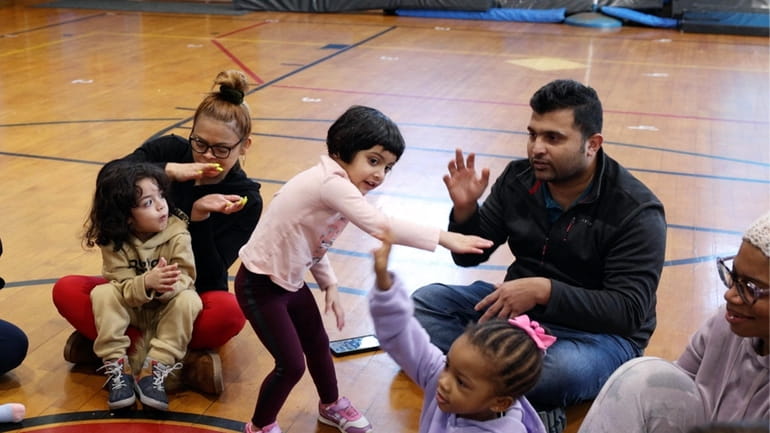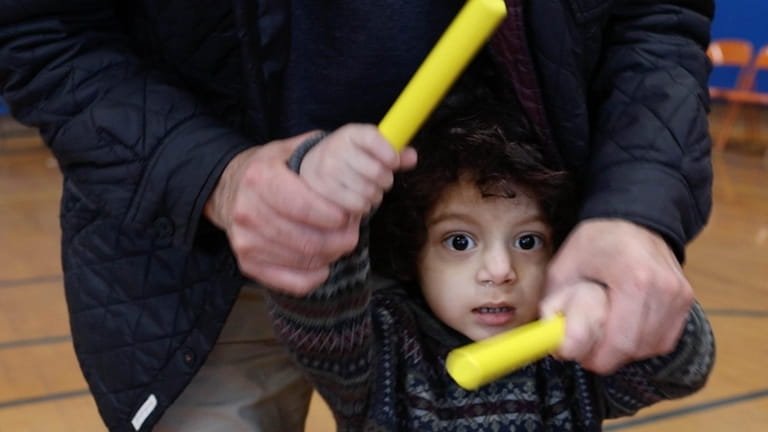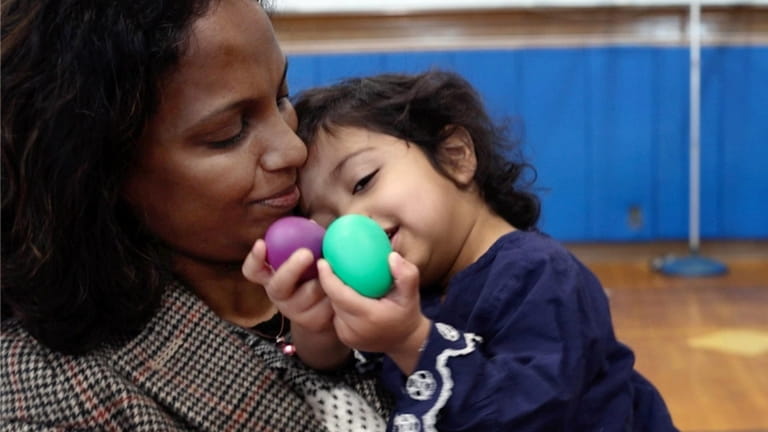New Elmont schools initiative partners with parents to help kids develop basic language, math and social skills

The Elmont school district is implementing a public health initiative that enlists the community's support to help their children succeed academically.
The district is the first on Long Island to adopt The Basics, a program developed by a Harvard economist that aims to narrow the cognitive skills and achievement gap in younger children caused by socioeconomic and racial disparities. The imbalance has been documented by researchers in children as young as 2 — well before they attend school. The program, which launched in November, encourages parents and caregivers to use real-life situations to help infants and toddlers develop basic language, math and social skills by the time they reach kindergarten.
“It’s definitely about equity and making sure all families have the tools to make their children succeed,” said Audrey Cabbell, director of pupil personnel services for the district. “We want to make it a better school community and to close that achievement gap. We want to make sure we have all kids reading by the third grade and that can only happen with community support and help.”
Health departments, early learning centers, libraries and hospitals nationwide have implemented the five ideals developed by economist Ron Ferguson: maximize love and manage stress; talk, sing and point; count, group and compare; explore through movement and play; and read and discuss stories. These principles target children ages birth to 3 years old, when the majority of brain development occurs. The district holds classes on each topic, where parents help their children with vocabulary, interacting with their environment, reading and managing stress.
Cabbell said the program offers suggestions that are easy to implement, such as identifying colors in nature or counting trees. The goal is to show meaningful, but simple, ways to incorporate educational opportunities into normal routines. At a dance class last month, for example, parents jived with their little ones as the toddlers shook noisemakers and boogied.
Mary Fernandez, of Elmont, brings her daughter, Neeva Chaudhary, to the dance class, where the 19-month-old practices moving to music. Children also learn hand-eye coordination and how to follow directions.
“You don’t just want to give them the phone or the TV, especially when they're so little,” said Fernandez, who works as a social worker. “I know it sounds like something that’s very basic, but when you see it from someone that works with children or that’s a professional, then you have that validation that this actually works.”
Elmont is a racially diverse district, with more than 100 countries represented in the student body, Cabbell said. The program helps to narrow achievement gaps before students enter the classroom, when established disparities are harder to overcome, she said.
The district holds monthly workshops and offers the program at a "minimal cost," paid through the general fund, a spokesperson said. About 40 parents are currently participating in the program.
“We want to try and find a way we can become almost like a hub,” said Helisse Palmer, assistant director of pupil personnel services and special education and early childhood program coordinator. “The whole idea of The Basics program … is that it does bring all these different entities together to work collaboratively.”
Lisa Minicozzi, an education clinical associate professor at Adelphi University in Garden City, has spent her career evaluating educational programs. This one could be a winner, she said.
“I think it’s brilliant on a number of fronts,” Minicozzi said. “It seems to me that Elmont is really recognizing that our traditional models of parent engagement or parent involvement have traditionally been really one-sided in schools. Now, we’re trying to reengage and be more community-centered and community-minded.”
Partnering with parents to spread the word about supporting early childhood development, “when all the neurons are firing,” can change the trajectory of a child’s life, she said.
“Post-pandemic teaching and learning, we absolutely have to leverage our communities and talk about partnering much more explicitly,” Minicozzi said.
The Elmont school district is implementing a public health initiative that enlists the community's support to help their children succeed academically.
The district is the first on Long Island to adopt The Basics, a program developed by a Harvard economist that aims to narrow the cognitive skills and achievement gap in younger children caused by socioeconomic and racial disparities. The imbalance has been documented by researchers in children as young as 2 — well before they attend school. The program, which launched in November, encourages parents and caregivers to use real-life situations to help infants and toddlers develop basic language, math and social skills by the time they reach kindergarten.
“It’s definitely about equity and making sure all families have the tools to make their children succeed,” said Audrey Cabbell, director of pupil personnel services for the district. “We want to make it a better school community and to close that achievement gap. We want to make sure we have all kids reading by the third grade and that can only happen with community support and help.”

Mustafa Mehmood, 2, and dad Rehan Mehmood, participate in a dance class at Covert Avenue Elementary School. Credit: Debbie Egan-Chin
Health departments, early learning centers, libraries and hospitals nationwide have implemented the five ideals developed by economist Ron Ferguson: maximize love and manage stress; talk, sing and point; count, group and compare; explore through movement and play; and read and discuss stories. These principles target children ages birth to 3 years old, when the majority of brain development occurs. The district holds classes on each topic, where parents help their children with vocabulary, interacting with their environment, reading and managing stress.
Cabbell said the program offers suggestions that are easy to implement, such as identifying colors in nature or counting trees. The goal is to show meaningful, but simple, ways to incorporate educational opportunities into normal routines. At a dance class last month, for example, parents jived with their little ones as the toddlers shook noisemakers and boogied.

Mary Fernandez of Elmont brings her 19-month-old daughter, Neeva Chaudhary, to a dance class at Covert Avenue Elementary School. Credit: Debbie Egan-Chin
Mary Fernandez, of Elmont, brings her daughter, Neeva Chaudhary, to the dance class, where the 19-month-old practices moving to music. Children also learn hand-eye coordination and how to follow directions.
“You don’t just want to give them the phone or the TV, especially when they're so little,” said Fernandez, who works as a social worker. “I know it sounds like something that’s very basic, but when you see it from someone that works with children or that’s a professional, then you have that validation that this actually works.”
Elmont is a racially diverse district, with more than 100 countries represented in the student body, Cabbell said. The program helps to narrow achievement gaps before students enter the classroom, when established disparities are harder to overcome, she said.
The district holds monthly workshops and offers the program at a "minimal cost," paid through the general fund, a spokesperson said. About 40 parents are currently participating in the program.
“We want to try and find a way we can become almost like a hub,” said Helisse Palmer, assistant director of pupil personnel services and special education and early childhood program coordinator. “The whole idea of The Basics program … is that it does bring all these different entities together to work collaboratively.”
Lisa Minicozzi, an education clinical associate professor at Adelphi University in Garden City, has spent her career evaluating educational programs. This one could be a winner, she said.
“I think it’s brilliant on a number of fronts,” Minicozzi said. “It seems to me that Elmont is really recognizing that our traditional models of parent engagement or parent involvement have traditionally been really one-sided in schools. Now, we’re trying to reengage and be more community-centered and community-minded.”
Partnering with parents to spread the word about supporting early childhood development, “when all the neurons are firing,” can change the trajectory of a child’s life, she said.
“Post-pandemic teaching and learning, we absolutely have to leverage our communities and talk about partnering much more explicitly,” Minicozzi said.
Brush fire at Lakeland Park ... Offshore wind projects cancelled ... Pitbull at Jones Beach ... Jericho H.S. ranks top
Brush fire at Lakeland Park ... Offshore wind projects cancelled ... Pitbull at Jones Beach ... Jericho H.S. ranks top

